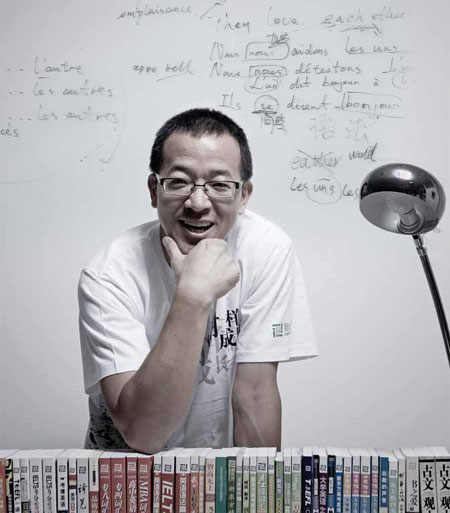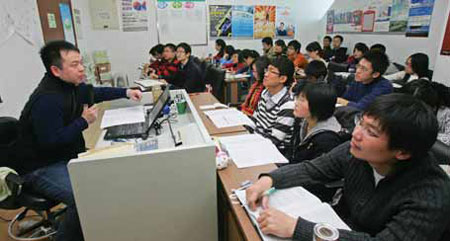Top marks for persistence
Updated: 2012-05-25 08:28
By Hu Haiyan (China Daily European Weekly)
|
|||||||||||
|
Yu Minhong, founder and president of New Oriental Education and Technology Group. Photos Provided to China Daily |
|
About 2.3 million students were enrolled in New Oriental schools across China in 2011. |
Man behind major english language group shares some secrets
He is regarded as the richest teacher in China. Tens of thousands of his students recognize him as "the godfather of overseas study". He is the doyen of the country's English-language education industry. But if there is one lesson that Yu Minhong's success imparts, in any language or subject, it is that persistence pays. In other words, "if at first you don't succeed ..."
Yu, the son of poor farmers, twice failed his college entrance exams because of his low marks in English.
Now, because of his proficiency in English - and business - his personal assets are worth more than 2 billion yuan ($316 million, 249 million euros).
You wouldn't know it to look at him, dressed casually like Bill Gates or Mark Zuckerberg, with his quiet and unassuming manner, but that persistence continues to this day to drive the 49-year-old founder and president of New Oriental Education and Technology Group. The company is China's biggest in its sector with a total revenue of $558 million (436 million euros) last year.
"It is persistence that has led us to what we are today and what we will need to expand further in the future," Yu says.
Any Chinese student wishing to study at universities in the United States, Europe, Canada or Australia will almost inevitably come across his name. So popular are his English-language education and training courses, he is often greeted on the streets by students like a celebrity.
The Beijing-based New Oriental Group now accounts for about 50 percent of the Chinese market in English education for overseas study, and 5 percent of the total English-language education industry, Yu says.
For Yu, the development of his company is the best reflection of China's private economy, full of stories of opportunities grasped and challenges conquered.
And there are still plenty of opportunities and challenges to be had, Yu says of the booming domestic English education market.
"Currently, the market for private English education and training in China is expanding very fast. Demand for English-language test preparation is growing at 30 percent each year. This means great business opportunities for schools like us," he says.
According to an earlier report on China's private education industry development released by Deloitte, the domestic market for English-language education stood at 30 billion yuan last year. But Yu expects the market will be worth about 60 to 80 billion yuan by 2015.
He says New Oriental aims to open schools in second- or third-tier cities and in the western regions of China to tap the fast-growing market.
"In the less developed areas of China, people are putting greater importance on English education now. Compared with developed areas, public schools there do not have the same quality of education resources, so the English education and training market has great potential," he says.
New Oriental has 608 English-language training schools and centers in China, most of which are in Beijing, Shanghai and Guangzhou. Yu says he plans to open about 100 new schools and centers in less developed areas by 2015.
The company keeps investing in the online business operations and the revenue in online business is increasing more than 40 percent every year.
It is all a far cry from Yu's beginnings in education. Born into a poor farming family in Jiangyin, East China's Jiangsu province, he was expected by his parents to become a teacher. But his path to a successful career in education was far from smooth. He failed two consecutive national college entrance exams because of his low English scores.
"Though I am nicknamed the 'godfather of overseas study', it is a bit ironic that I spoke very poor English at the beginning," Yu says.
Finally, at his third attempt, he succeeded in gaining admission to Peking University's department of Western languages and literature.
His first job after graduation in 1985 was teaching English at Peking University. "I was so proud because the university was so famous." But he was paid only 120 yuan a month.
There was a craze for studying overseas in the mid-1980s and many of Yu's classmates went abroad. Yu eventually gained admission to a US university, but as it only offered a small scholarship, he had to find part-time jobs to earn the 40,000 yuan needed to cover tuition fees. So Yu and several other classmates taught other students outside the university preparing for their English-language exams. But moonlighting was forbidden by Peking University and he left the university in 1991.
Together with his wife, Yu started running English classes from a rented room of a primary school in Beijing. But few students came at first and Yu had to give free lectures to attract more people.
In 1993, he decided to open his own school, New Oriental, but with little money to promote it, he and his colleagues had to distribute brochures in the cold of winter. Again, hard work and persistence paid off, and within two years, more than 1,000 students had enrolled.
By this time, he had enough money to study abroad, but he decided instead to expand the school. He did travel to the US, however, to persuade his former classmates, such as Wang Qiang and Xu Xiaoping, to return home and join the New Oriental school. The three would form the "troika of New Oriental", driving the group forward.
Xu says that during the 1990s, few people who were studying or living overseas would return to China, "because then the living standard was far worse than that of the developed countries".
It was Yu's persistence, as well as kindness, which made him accept the offer, not the handsome payment, Xu recalls.
"Yu Minhong is not only very kind - because there was no hot water in the dormitory at university, he helped the roommates pick up the boiled water for almost four years - he is also very persistent, which impressed me very much. I believed we could succeed if I joined his group," Xu says.
New Oriental has since become a hub for many other well-known English teachers. Luo Yonghao, founder of Laoluo English, and Hu Min, founder of New Channel International Education Group, have taught at New Oriental, and both say they learned a lot from Yu. They also praise his generosity.
In 2006, New Oriental was listed on the New York Stock Exchange, the first Chinese education company to go public in the US.
As the largest domestic English education and training school in China, the company had 2.3 million students enrolled across the nation last year.
During the first quarter of this year, it took in revenue of $174.5 million, a 31.7 percent increase on the same period last year.
Yu still likes teaching English and occasionally takes to the floor himself to deliver classes.
But one of the biggest challenges facing New Oriental is in the area of intellectual property rights (IPR).
"IPR is very important for the sound and sustainable development of an education company like us," Yu says.
It was a painful lesson for New Oriental to learn. In 2001, the company was accused of illegally copying, publishing and selling exam questions by two US graduate study test administration agencies. It was fined $774,000 and required to make a public apology.
"The lesson reminds us to put more efforts to develop our own brands and products," Yu says.
New Oriental now annually spends about 5 percent of its revenue on developing new products, and is cooperating with renowned foreign institutions such as Cambridge University.
Another big challenge is finding teachers.
"Teachers from public schools are a major source of our employees, but their work as tutors is restricted in many Chinese cities, which is a big obstacle in the way of our expansion," Yu says.
However, he believes improving products and quality of services are more important than just expanding their market to meet increasing competition.
"The country's English education market has become a gold mine with huge potential, and is attracting an increasing number of competitors. Some leading global English training companies, such as EF Education and Pearson, have established schools in the Chinese market. The competition will definitely become more and more fierce," Yu says.
But he also points out that the increased competition can also lead to a more sound and sustainable development of the market.
Whatever happens, Yu Minhong will persist.
huhaiyan@chinadaily.com.cn
Today's Top News
Rescuers race against time for quake victims
Telecom workers restore links
Coal mine blast kills 18 in Jilin
Intl scholarship puts China on the map
More bird flu patients discharged
Gold loses sheen, but still a safe bet
US 'turns blind eye to human rights'
Telecom workers restore links
Hot Topics
Lunar probe , China growth forecasts, Emission rules get tougher, China seen through 'colored lens', International board,
Editor's Picks

|

|

|

|

|

|







